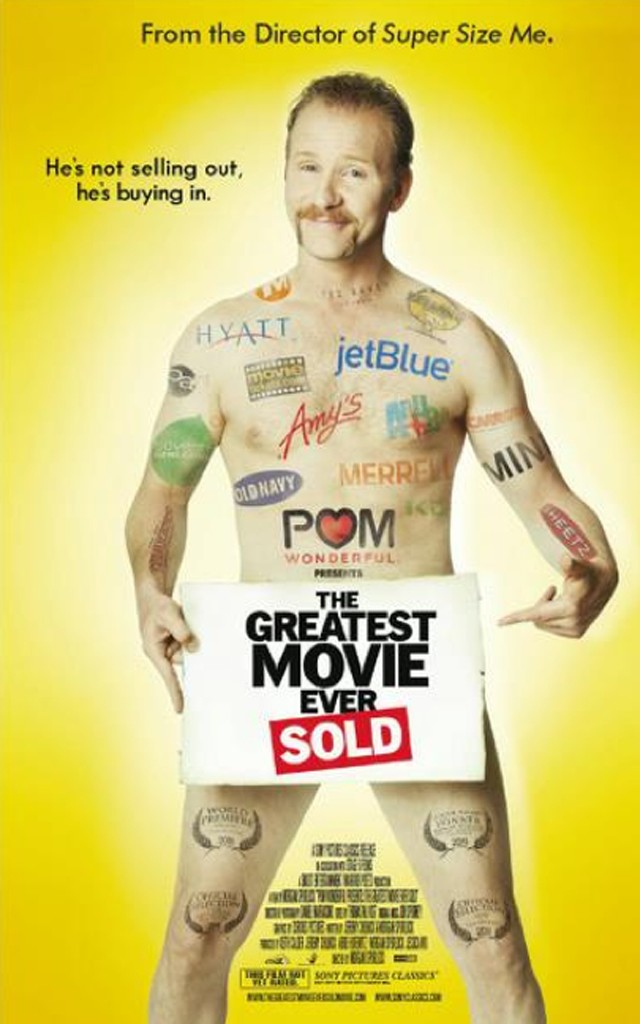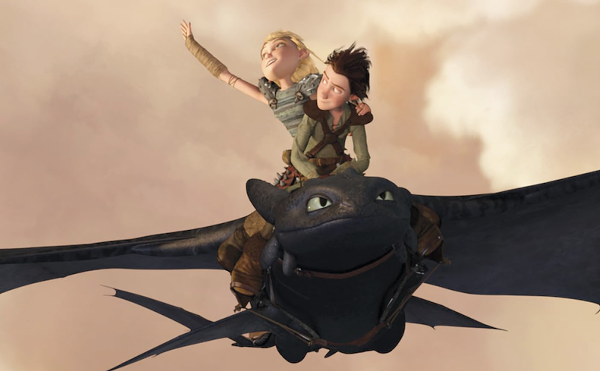POM Wonderful Presents: The Greatest Movie Ever Sold
Dir. Morgan Spurlock; writ. Morgan Spurlock, Jeremy Chilnick; feat. Morgan Spurlock, Peter Berg, Paul Brennan, Noam Chomsky. (PG-13)
In 2004, filmmaker Morgan Spurlock captured audiences’ imaginations with a documentary in which he turned the camera on himself to prove a point — that fast food is not only ubiquitous but toxically so — with self-examination, pluck, and an everyman curiosity. He made it seem like anybody could blow out their tiniest nagging anxieties to “docbuster” proportions, as long as they were charismatic, open to scrutiny, and willing to chisel away at corporate barriers until they were forced to come down. Super Size Me took us back to the days of Michael Moore’s Roger & Me and the then-novel concept that making a documentary could be as simple as, “I have a question and I’m not that smart, so I’m going to learn as I go and take you along.”
Seven years and many diminishing returns later, Spurlock has made a non-documentary –– in fact, it’s hardly a film. Pom Wonderful Presents: The Greatest Movie Ever Sold (yes, the title is a huge chunk of his joke) sets up its premise right off the bat: Spurlock will fund a documentary about branding, marketing, and product placement in the entertainment world, and it will be financed by corporate sponsors! He’ll sell naming rights! He’ll only wear shoes, or pump gas, or stay in the rooms, or drink the beverages of companies that fund his film! Wait, wait: There could be ads within the movie for those products and signage behind the people he interviews!
One problem: He forgot his question. Actually, it’s more of a freshman-level observation: “Hey, marketing is all around us, man! Like, everywhere you look there are logos and somebody trying to sell us something. Weird.” Fascinating, Morgan, tell us more.
He promptly meets with high-level product placement experts and branding managers, some of whomwho take him on as a project and play dumb. “You could be a brand yourself!” marvels one ad exec who is clearly schooled in the art of saying a lot while saying nothing. Of course he could: He is a brand already. That’s why he has 19 producing credits to his name and has appeared everywhere, from Top Chef and The Simpsons, to The View and 20/20. That’s why you took a meeting with him in the first place.
Spurlock gleefully sells himself and his idiotic idea throughout the movie, and the rare instances when he feels compelled to, you know, talk about his original point, he interviews either people on the street who know little about the inner workings of the marketing machine in Hollywood – — “What brand are you?” is a typical meaningless question he poses – — or engages the usual social-commentary suspects: Noam Chomsky and Ralph Nader, for instance. In case you’re wondering, no, they don’t really say anything, either.
The few times he actually speaks to Hollywood directors (which, if I understand his premise correctly, was the whole point) we learn that product placement is increasingly ubiquitous, but he does no digging. He chats up Peter Berg, director of Hancock and the mastermind behind the amazing TV show Friday Night Lights and the film that preceded the TV show, who tells him that corporations don’t care about art, but they don’t meddle too much. Or J.J. Abrams, whom Spurlock cuts off after a few seconds to get back to his own story of selling his movie.
Most unforgivably, he nails down Brett Ratner, the source of all things unholy (according to some cineastes) who, besides directing films like Rush Hour and Charlie’s Angels, works on the side as an actual product placement advisor for a $1 million annual retainer! Spurlock doesn’t bring this up, but does let Ratner off the hook when Ratner literally says, “Artistic integrity? Pshaw.”
Spurlock visits São Paulo, Brazil, where, in a unique move, all advertising signage has been outlawed, and a school in Broward County, Fla. that has resorted to selling ad space on school grounds to fund after-school programs. Guess what he talks about the whole few minutes he’s there? His movie.
Pom Wonderful Presents is perhaps the most pointless, indulgent, incurious documentary ever made. Don’t get me wrong: I have no moral or cinematic objections to corporations funding documentaries, setting aside this film’s disturbing rug-sweeping of a potentially game-changing proviso in Pom Wonderful’s sponsorship contract: final approval of the entire film. (Spurlock claims via title card at the end that he had control, but there are exactly a million reasons to doubt that.) If, someday, we’re given Pom Wonderful Presents: Crimes Against Humanity: The Congolese Genocide Story, I would say that’s money well spent and needed. But we don’t need a giggling Morgan Spurlock wasting 90 minutes and couching it as a “documentary” simply because he threw in a few facts and figures. That’s no less than intellectual dishonesty. If I wanted that, I’d rather see it in Dr. Pepper Presents: Iron Man 3.















